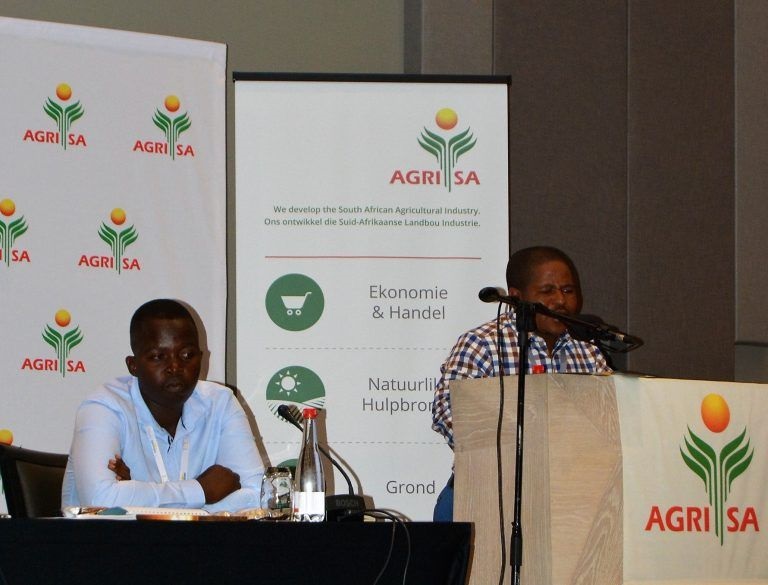
Top stories






LifestyleWhen to stop Googling and call the vet: Expert advice on pet allergies from dotsure.co.za
dotsure.co.za 2 days
More news




















Christo van der Rheede, deputy executive director at Agri SA, introduces the speakers and the new Agrohub website.
The website, Agrohub, was created to promote and unlock agricultural opportunities for those interested in taking part in transformation projects. Van der Rheede also said that the platform will be used for showcasing the good stories of transformation which are often overlooked in the media amidst negative and sensationalist stories about farmers.
Three speakers shared inspirational success stories in the agricultural industry with delegates.
Gloria Serobe, founding member and executive director of Women Investment Portfolio Holdings Limited (WIPHOLD), a black women-owned investment company that focuses on acquiring and building strategic investments in agriculture, and CEO of Wipcapital, subsidiary of Women Investment Portfolio Holdings Limited, shared some of the inspirational success stories they are involved in.
A project in the poorest rural areas of the Eastern Cape has established a food security hub on communal land where they have expanded maize production from 69ha to 2 500ha in five years. Average yields are seven to eight tons per hectare. Soya beans were added to the production system as a rotation crop. The goal is to incorporate livestock and cash crops in the production system in the future. Serobe also said that the hub will soon include processing, to expand the project to cover the whole value chain.
Gloria Serobe, founding member and executive director of WIPHOLD has helped rural farmers ensure food security for themselves.
Serobe shared some of the challenges the project is facing, which includes the fact that these farmers are pioneers who do not have a history of family farming. Another is the fact that the land will take 10 to 15 years to rehabilitate and clean up because it is unworked land. High-quality inputs and machinery were also needed to make this project work. Serobe said that it was difficult to establish an input value chain where input providers could provide quality inputs without charging premium prices, which usually kills projects like this.
Although the project is established on communal land, Serobe said that it has shown that projects on communal land can be a success even without the security of land tenure, which is a common issue in land reform projects. The land is owned by 2 000 families with 62% owned by women.
Etienne van Wyk, a sheep farmer that currently farms in Marydale in the Northern Cape, shared his success story as a candidate of one of the Department of Rural Development’s land reform projects. His father was a farm worker for renowned sheep breeder Dries Wiese. He was born on this farm and grew up following his father on the farm and learned from a young age to take care of livestock. After he finished school he furthered his agricultural education at Grootfontein Agricultural College. After this, he worked as a foreman on Wiese’s farm where he was responsible for the boergoats, sheep and cattle.
After just eight months he was promoted to a senior management position where he was responsible for one of Wiese’s other farms of 10 000ha and later he was again promoted to manage an 18 000ha farm. Eventually, Wiese suggested that he farm on his own and nominated Van Wyk as an ideal candidate to the Department of Rural Development. This is how he came to farm in the Northern Cape.
The government land that he farms on did not even have water or electricity but, as a person that easily adapts to any situation, he made the best of the opportunity he was given. The government gave him five years to prove himself as a farmer, but Van Wyk says that he proved himself in only a year and a half. This farm is now as full of livestock as the land allows and he feels limited as he does not have access to financing that will allow a smallholder farmer to acquire more land. He emphasised the fact that there is a dire need for custom credit and loan solutions for small farmers like him, who do not have title deeds in their own name, since they do not own the farms themselves.
Tshilidzi Matshidzula (Chillie), a dairy farmer from the Eastern Cape started his career as an intern on a farm in 2007. After completing his tertiary training, he was appointed as manager of the farm at only 19 years old. He helped transform the farm, that was owned by 18 black beneficiaries, into a dairy farm. He later had the opportunity to buy into the business and established a company to do this but struggled to get help from government departments. He eventually bought out the 18 beneficiaries, but it was no easy task. He had to sell all his assets to do so.
With only 200 cows being milked on the farm at that time, he realised the farm will not make it if he did not expand. Chilli made a plan to expand the farm by selling 50% to a commercial farmer. This allowed him to free up capital to develop further and they are now milking just under 800 cows. They will continue to develop, says Chilli, and will be able to milk 1 000 cows by the end of next year. He values mentorship and skill development, because this is what helped him make his farm a success. His farm now has its own mentorship programme that includes a study group and provides intern opportunities for students.

AgriOrbit is a product of Centurion-based agricultural magazine publisher Plaas Media. Plaas Media is an independent agricultural media house. It is the only South African agricultural media house to offer a true 360-degree media offering to role-players in agriculture. Its entire portfolio is based on sound content of a scientific and semi-scientific nature.
Go to: http://agriorbit.com/